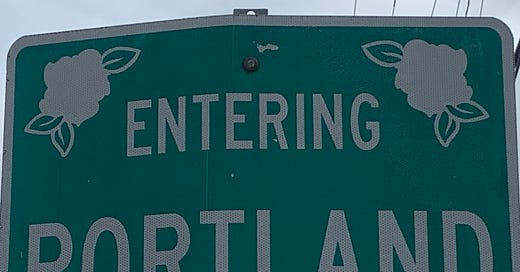Betting on Portland. How’s that going?
After three years of negative headlines and despite some very real problems, Portland has planted the seeds for success in recent weeks
We’ve endured an extended, gloomy season. And it wasn’t just the weather. News about Portland’s economy and livability has been unrelentingly downbeat during the past many months. Multnomah County shed 12,000 residents in 2022. Portland’s downtown recovery is the third worst among major U.S. metros. Vacancies in downtown offices are at all-time highs and rising. And almost 5,000 people live on our streets across the region. Disturbing trends are everywhere, and it’s easy to pile on.
The harder work is identifying the earliest signs of a turnaround. Signs of hope. I saw three last month.
The first was the announcement of longtime Kaiser Permanente executive Dan Field to head the Multnomah County-City of Portland Joint Office of Homeless Services (JOHS). Mr. Field, a former aide to Vera Katz and John Kitzhaber, brings political skills along with much needed management and health system expertise. Thanks in large part to regional supportive housing services measure, he has a lot of resources to work with – the JOHS’s budget grew 63%, from $161 million to $262 million during 2022-2023. The money is sufficient to reduce homelessness compassionately and measurably. Job #1 for Mr. Field: Get the city and county aligned around a common goal on reductions in unsheltered homelessness and build a unified strategy to meet it.
A second sign appeared at a semiconductor summit co-hosted by Purdue University in Washington, DC. The summit’s featured panel had Purdue’s president, Indiana’s senior U.S. senator, and Commerce Secretary Gina Raimondo discussing implementation of the CHIPS Act — the 2022 federal legislation to enhance U.S. semiconductor manufacturing capabilities. Raimondo was asked how state and local governments might complement the federal effort. Sitting between her Indiana hosts, she gushed about the vibrancy of Portland’s semiconductor sector. “It’s huge, unbelievable actually,” she said recounting her an April visit to the region. And then she went on to describe how the Oregon legislature had passed its own version of the CHIPS Act, the day after her visit.
Kudos to the business community for a yearlong effort to clarify its needs in workforce development, land availability, and permitting reform. Oregon has its act together, and the Secretary saw our region for what it is: a global center of arguably the most important industry of the 21st Century.
The third sign was hard to miss—the $400 million pledge from Phil and Penny Knight to invest in Portland’s historically Black Albina neighborhood. The Knights’ choice in a partner, Rukaiyah Adams, was as important as the money. Knight built his fortune picking winners, and he’s done it again. Some see Adams, a lawyer turned investor, as a future mayor or U.S. Senator. But those roles will have to wait. She’s on a mission to rebuild a neighborhood destroyed during 1950s freeway building and so-called “urban renewal.” Many barriers stand in her way of rebuilding an equitable, vibrant, and inclusive community — most notably the 360,000 square foot Portland Public Schools headquarters.
The Knight investment, and others that will likely join it, will move her vision into action and earn Portland a reputation as a city that has the courage to revisit the darkest chapters of its history, acknowledge them, and take decisive action to address them.
Early signs are just that — early signs, and a lot must go right for any of these green shoots to grow into genuinely good news. There will plenty of more bad news in coming months, and it will tempt you to bet against Portland. But if you do, remember Phil Knight is now on the other side of that bet.
The author is a senior policy advisor at ECONorthwest and authored “Don’t Bet Against Portland” in late 2020 after the onset of a pandemic, social justice protests, and historic wildfires. To read that column click here.




This is encouraging. My son and his wife just relocated to my city from the Portland area (Vancouver, WA), where they’ve lived together for 10 years (my daughter-in-law is a native Vancouverite).
I’ve often wondered why Portland and Vancouver don’t work together more on shared issues, like transportation and homelessness.
I come from a river city/state juxtaposed city as well (Cincinnati, which shares a border with both No. Kentucky and SE Indiana). I’m accustomed to thinking of us as a single region with shared responsibilities.
Glad Knights will help with Albina, but I could not be more angry at him for trying to buy the legislature. I am so sick of the super rich thinking they know better what we all need. The sickest thing in this country is the money in politics.